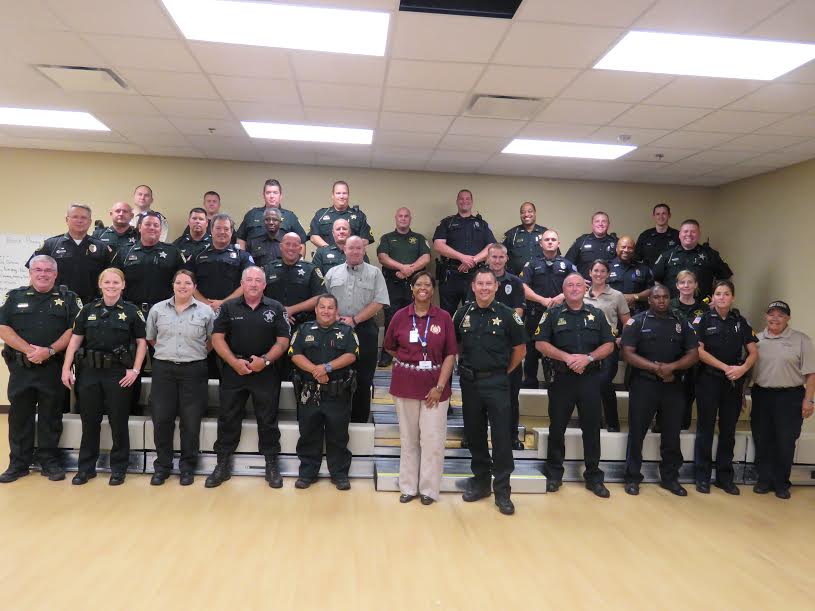CIT readies officers to deal with suspects with mental illness
- August 25, 2015
- / Louis Cooper
- / community-dashboard

While acts of public violence in places like movie theaters, churches and military recruitment centers dominate national headlines, even local law enforcement officers are faced with situations that may involve perpetrators with mental health issues.
In Escambia and Santa Rosa counties, the Crisis Intervention Team training program seeks to teach officers how to effectively deal with suspects with potential mental illness. To date, 659 officers have been CIT trained in both counties.
The course is offered quarterly by Lakeview Behavioral Health.
“The Crisis Intervention Team is an innovative first-responder model of law enforcement based crisis intervention with community, health care and advocacy partnerships,” said Mary Carter, CIT’s mental health program coordinator at Lakeview.
“CIT provides law enforcement-based intervention training for assisting those individuals with a mental illnesses, family members and citizens within the community.”
That's important because local public safety officials — including law enforcement — have increasingly found themselves becoming the gatekeeper for suspects who have mental health issues. In fact in a U.S. Department of Justice report, access to proper mental health care was cited as a deficiency at the Escambia County Jail.
When Escambia County's new corrections chief, Michael Tidwell, took charge, he praised the effectiveness CIT-training can have based on his experience with it in other cities, including Memphis, where the CIT model was developed. Read our interview with him from earlier this year here.
The most recent CIT training was Aug. 3-7. The class session was geared toward helping school resource officers in Escambia and Santa Rosa counties.
Law enforcement agencies involved with Northwest Florida Regional CIT Task Force include:
— Santa Rosa County Sheriff’s Office.
— The Department of Law Enforcement and Corrections.
— Escambia County Sheriff’s Office.
— Pensacola Police Department.
— Milton Police Department.
— Gulf Breeze Police Department.
— University of West Florida Police Department.
— Pensacola State College.
— Escambia County Jail.
There is no cost to agencies for the training and officers are paid their usual salary during the training. Instructors volunteer their time.
The 40-hour course includes expert speakers and tours of local facilities. It instructs officers on signs, symptoms and behaviors related to mental illnesses, and de-escalation skills for the encounters. It is based on the Memphis model.
Skills taught at CIT to help de-escalate suspects with mental illness include:
— Setting reasonable boundaries and limits that offer the individual genuine choice rather than an ultimatum. Individuals are presented with positive choice first, like, "Would you like to talk to a counselor or someone at Lakeview?"
— Focusing on establishing rapport with the individual. The individual may naturally gravitate to talking to one officer versus another, so the favored officer takes lead in helping establish rapport.
— Having an awareness that individual may not be able to give quick or timely response due to traumatic event. Officers are taught to allow time for processing.
— Understanding "out of the blue' behaviors,” which can sometimes stem from internal experiences such as hallucinations or delusions.
— Becoming aware that officer safety is enhanced with time spent in developing rapport.
— Looking for early warning signs such as distraction, rambling and illogical speech.
— Looking for impact of substances on individuals functioning.
Santa Rosa Sheriff’s Office Lt. Patrick Vega, who coordinates the CIT task force, said most officers have had some training dealing with offenders who suffer from mental health issues, but CIT training is a welcome supplement.
“Law enforcement officers are exposed to and see the worst things possible on a continuous basis,” Vega said. “They get hardened to situations in order to insulate themselves. This is a coping mechanism, and sometimes it is difficult to get through the shield we put up.”
CIT training can help, he said.
“Deputies and officers have to make decisions in fractions of seconds in some instances,” Vega said. “However, I have seen how using CIT skills can de-escalate volatile situations if time allows for it.”
While Vega is not aware of any data about how often mental illness plays a role in violent crime, he has seen it many times in his own work.
“I have seen individuals (who appeared to have mental illness) commit thefts, batteries, assaults and trespassing,” he said. “There is a segment that is even violent with law enforcement as is evidenced by one of our deputies being attacked by an individual with a sword.”

 CivicCon launches with a look at good growth in cities
CivicCon launches with a look at good growth in cities
 Building stronger brains one baby, one parent at a time
Building stronger brains one baby, one parent at a time
 SCI debuts commercial on Early Learning City
SCI debuts commercial on Early Learning City
 Entrecon: World class speakers and an opportunity to sharpen skills
Entrecon: World class speakers and an opportunity to sharpen skills
 PYP Quality of Life survey 2017
PYP Quality of Life survey 2017
 EntreCon Pensacola 2016: A look back
EntreCon Pensacola 2016: A look back
 Leadership tip: getting better employee takeaways
Leadership tip: getting better employee takeaways
 Leadership tip: be interested instead of interesting
Leadership tip: be interested instead of interesting
 Leadership tip: delivering difficult messages
Leadership tip: delivering difficult messages
 Brain Bags boost Arc, Early Childhood Court programs
Brain Bags boost Arc, Early Childhood Court programs